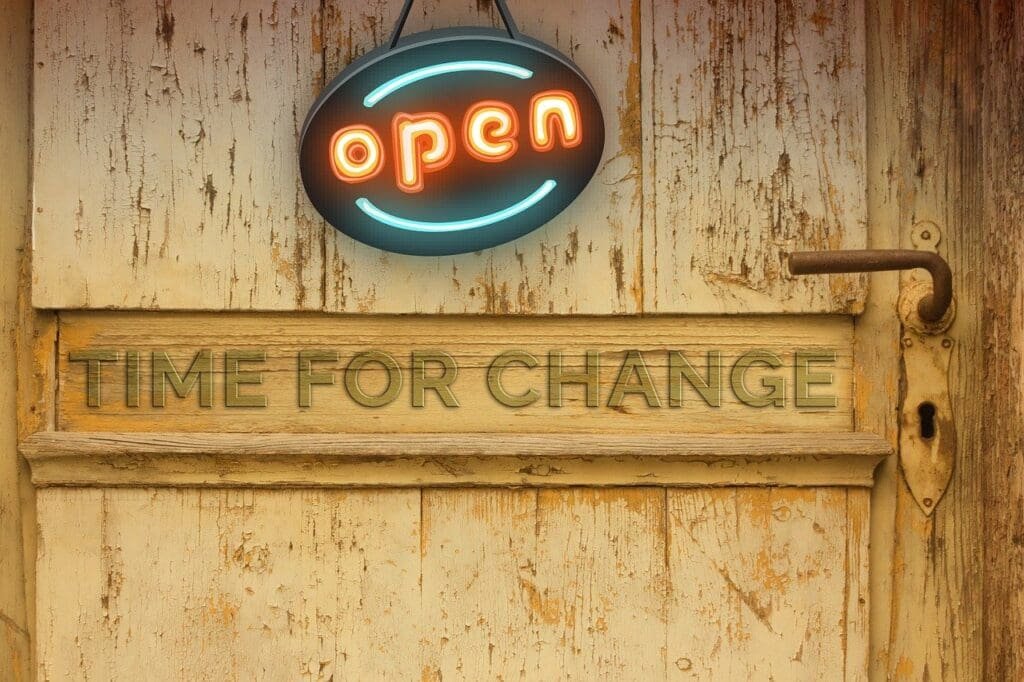
Intro
Change is an inevitable part of life, whether we like it or not. Some of us are quick to adapt and welcome new experiences, while others may feel resistant to change, preferring the comfort and familiarity of the known. But have you ever stopped to consider which category you fall under? Are you a change embracer or resistant? In this blog post, we will take a closer look at these two mindsets and how they affect our lives. So, if you’re ready to find out where you stand when it comes to change, let’s dive into this checkup and discover what it reveals about your attitude towards change.
The Importance of Understanding Your Relationship with Change
Change is a constant in our lives. From the moment we are born, we are thrust into a world that is ever-evolving. We experience changes in our relationships, our careers, our living situations, and even within ourselves. Change is an integral part of growth and development, and understanding our relationship with it is crucial for our overall well-being.
One of the key reasons why understanding our relationship with change is important is that it allows us to embrace it rather than resist it. Change is inevitable, whether we like it or not. By recognizing this, we can learn to accept and adapt to new circumstances, making the transition smoother and less stressful. Resisting change only causes unnecessary anxiety and limits our potential for growth.
Additionally, understanding our relationship with change allows us to identify patterns and tendencies that may hinder our ability to adapt. For example, if we tend to resist change, we can examine why that is and work on addressing any underlying fears or insecurities. On the other hand, if we are naturally inclined to embrace change, we can capitalize on this strength and use it to our advantage in navigating life’s challenges.
Taking the time to understand our relationship with change also empowers us to make conscious choices. When we are aware of our natural tendencies and reactions, we can intentionally choose to respond differently if necessary. We can make a conscious effort to embrace change when it is beneficial and make ourselves stronger in the face of adversity.
To truly understand our relationship with change, it is important to evaluate our response to it. This is where the checkup comes in. By asking ourselves probing questions and reflecting on our experiences, we can gain insights into our attitude towards change and uncover any areas that may need improvement.

Identifying a Change Embracer
In a world that is constantly evolving, there are individuals who effortlessly embrace change. These change embracers are the ones who welcome new experiences with open arms and are quick to adapt to different circumstances. But how can you identify if you fall into this category? Let’s take a closer look at the characteristics of a change embracer and see if you resonate with them.
First and foremost, change embracers have a positive outlook on life. They view change as an opportunity for growth and are not afraid to step out of their comfort zones. Instead of resisting change, they see it as a chance to learn, develop new skills, and expand their horizons.
Another characteristic of change embracers is their flexibility. They are able to adjust their plans and adapt to unexpected situations without much hesitation. They understand that life is full of uncertainties, and rather than letting these uncertainties hold them back, they see them as opportunities to explore new paths and possibilities.
Change embracers are also open-minded individuals. They are curious and willing to explore different perspectives and ideas. They understand that change often brings about new knowledge and insights, and they actively seek out opportunities to learn and grow.
Lastly, change embracers possess a strong sense of resilience. They understand that change can be challenging at times, but they are determined to overcome any obstacles that come their way. They see setbacks as opportunities for personal development and are willing to put in the effort to overcome them.
If these characteristics resonate with you, congratulations! You are likely a change embracer. However, if you find yourself resistant to change, don’t worry. It’s never too late to make yourself stronger in the face of change. Take the checkup in the next section to evaluate your response to change and discover ways to improve your adaptability. Remember, embracing change is a lifelong journey, and every step forward counts.

Recognizing a Change Resistant Mindset
Change can be difficult, and for some, it is a constant source of stress and anxiety. If you find yourself resistant to change, it’s important to recognize this tendency so that you can work towards embracing it instead. So, how can you recognize if you are resistant to change? Let’s dive into some common characteristics and behaviors that may indicate a resistance to change.
One telltale sign of being resistant to change is a strong attachment to routine and familiarity. You may feel a sense of discomfort or unease when faced with new or unfamiliar situations. The thought of stepping out of your comfort zone may fill you with anxiety and apprehension.
Another characteristic of being resistant to change is a fear of the unknown. You may feel overwhelmed by uncertainty and prefer to stick to what you know rather than taking risks. The thought of venturing into uncharted territory may seem daunting and unsettling.
Additionally, a resistance to change often stems from a desire to maintain control. You may have a need for stability and predictability, and any disruption to your carefully constructed plans can feel destabilizing. Letting go of control and embracing the unknown may be challenging for you.
Resistance to change can also manifest as a reluctance to learn new skills or adapt to new technologies. You may find yourself sticking to familiar methods and avoiding new experiences that require you to acquire new knowledge or skills.
If any of these characteristics resonate with you, it’s possible that you are resistant to change. But don’t worry, recognizing this is the first step towards growth and improvement. It’s important to remember that being resistant to change is not a fixed trait, and with effort and self-awareness, you can develop the ability to adapt and embrace change.
To further explore your relationship with change and understand your resistance better, take the checkup in the next section. It will provide valuable insights into your attitude towards change and guide you towards ways to improve your adaptability. Remember, change is an inevitable part of life, and by learning to embrace it, you can open yourself up to new opportunities and personal growth.

Evaluating Your Response to Change – A Simple Checkup
As we’ve discussed earlier, understanding our relationship with change is crucial for personal growth and development. To further explore your attitude towards change and gain insights into your adaptability, it’s time for a simple checkup. By answering the following questions honestly and reflecting on your responses, you can evaluate your response to change and gain a deeper understanding of whether you tend to embrace or resist it.
1. How do you typically react when faced with unexpected or new situations? Do you feel excited and curious, or do you feel anxious and hesitant?
2. Reflect on a recent change in your life. How did you initially respond to it? Did you embrace it with open arms or did you find yourself resisting it? How did your response affect your overall experience?
3. Think about your comfort zone. How often do you step outside of it? Are you willing to take risks and explore new opportunities, or do you prefer to stick to what is familiar and known?
4. Consider your mindset towards challenges and setbacks. Do you see them as opportunities for growth and learning, or do you feel discouraged and overwhelmed by them?
5. How open are you to learning new skills and acquiring new knowledge? Do you actively seek out opportunities to expand your horizons, or do you tend to stick to what you already know?
As you reflect on these questions, pay attention to any recurring themes or patterns that emerge. These insights will provide valuable information about your attitude towards change and help you identify areas for improvement.
Remember, there are no right or wrong answers to these questions. The goal is simply to gain self-awareness and understand your natural tendencies when it comes to change. With this understanding, you can take steps towards improving your adaptability and embracing change more effectively.
In the next section, we will explore some practical steps you can take to improve your adaptability and become more open to change. So, stay tuned and get ready to make positive changes in your life!

Steps to Improve Your Adaptability to Change
Improving your adaptability to change is a journey that requires effort and self-reflection. It’s important to remember that change is inevitable and can bring about positive growth and new opportunities. So, if you find yourself resistant to change, don’t worry. Here are some practical steps you can take to improve your adaptability and embrace change more effectively.
1. Develop a growth mindset: A growth mindset is the belief that you can learn and grow from challenges and setbacks. Instead of viewing change as a threat, see it as an opportunity for personal development. Embrace the idea that you can learn new skills, acquire new knowledge, and overcome obstacles along the way.
2. Step outside your comfort zone: Take small steps to push yourself out of your comfort zone. Start by trying new activities or exploring different hobbies. Challenge yourself to do something you’ve never done before. By exposing yourself to new experiences, you can build confidence in adapting to change.
3. Practice flexibility: Flexibility is a key trait of those who embrace change. Practice adapting to unexpected situations and adjusting your plans accordingly. Be open to different perspectives and ideas. Cultivate a mindset of flexibility and adaptability in all areas of your life.
4. Seek support and guidance: Surround yourself with people who have a positive attitude towards change. Seek support from friends, family, or mentors who can provide guidance and encouragement. Share your concerns and fears about change with them, and listen to their advice and experiences.
5. Embrace a learning mindset: Be open to continuous learning and personal growth. Take advantage of opportunities to expand your knowledge and acquire new skills. Stay curious and seek out information and resources that can help you navigate change more effectively.
6. Practice self-reflection: Take time to reflect on your responses to change and evaluate how they impact your overall well-being. Be honest with yourself about your resistance to change and identify any underlying fears or insecurities. Use this self-awareness to make conscious choices and work on improving your adaptability.
Remember, improving your adaptability to change is a process that takes time and effort. Be patient with yourself and celebrate even the smallest steps forward. By embracing change and becoming more adaptable, you can open yourself up to new experiences, personal growth, and a more fulfilling life.